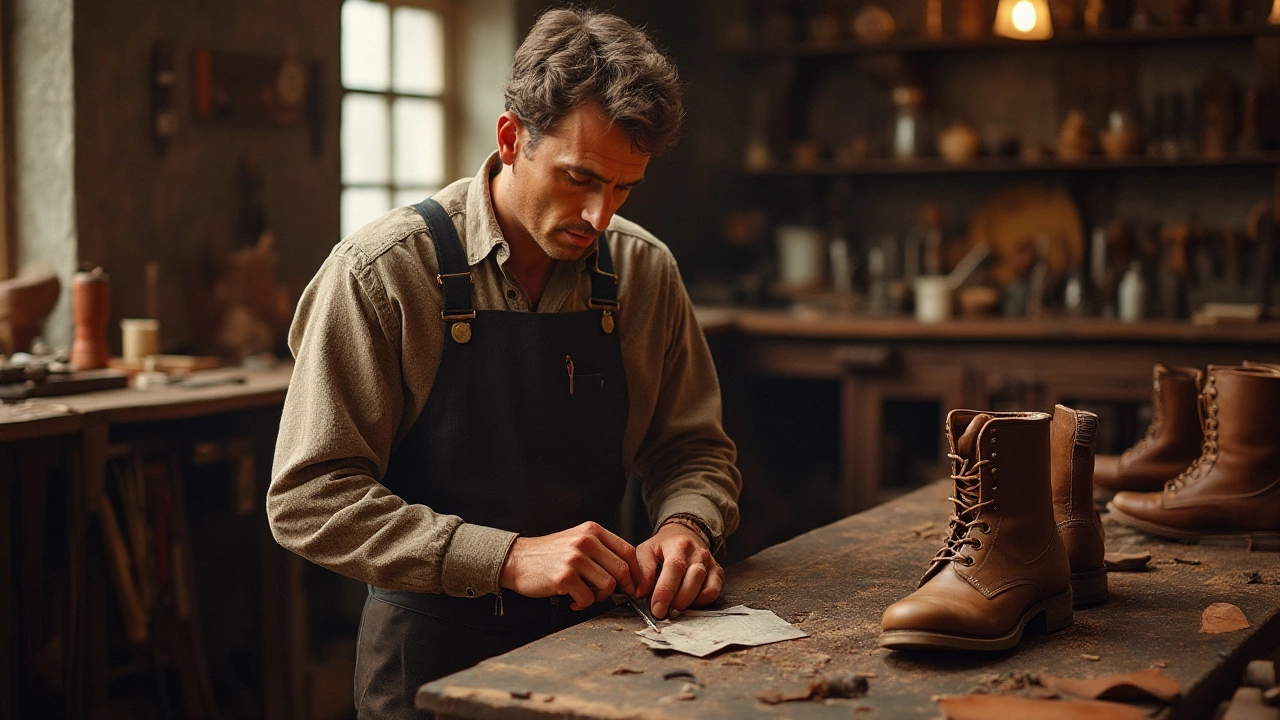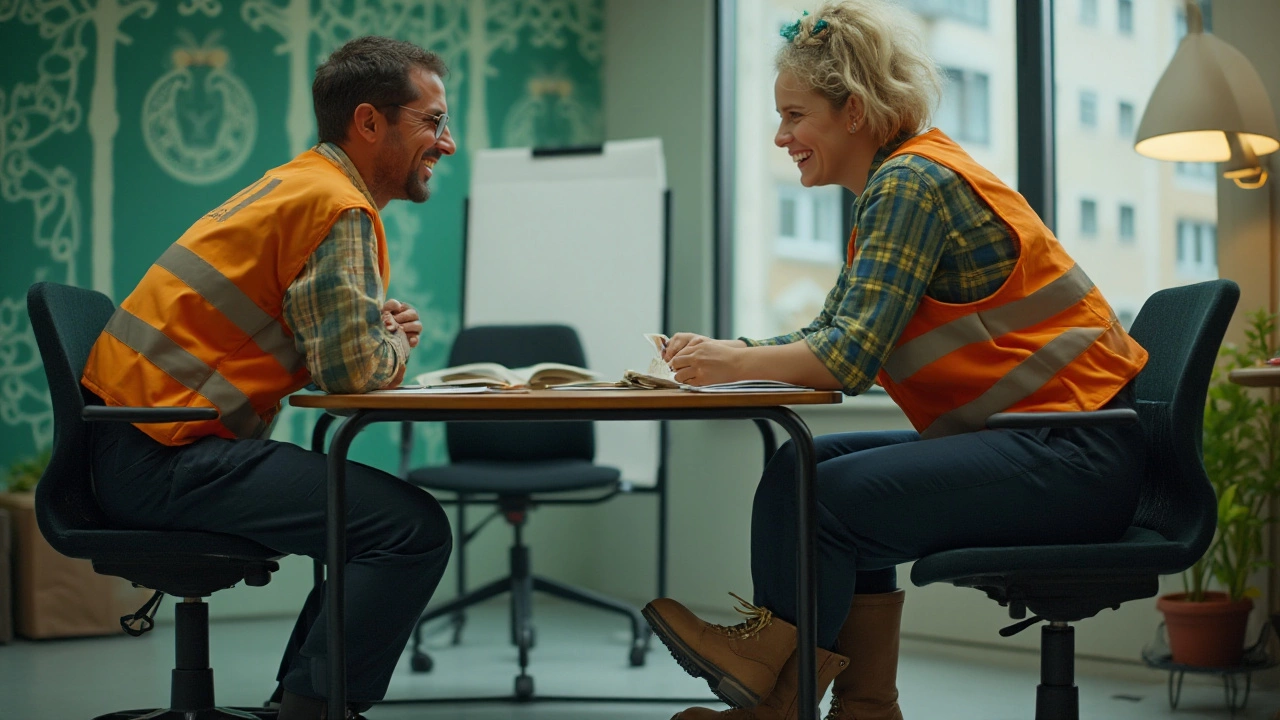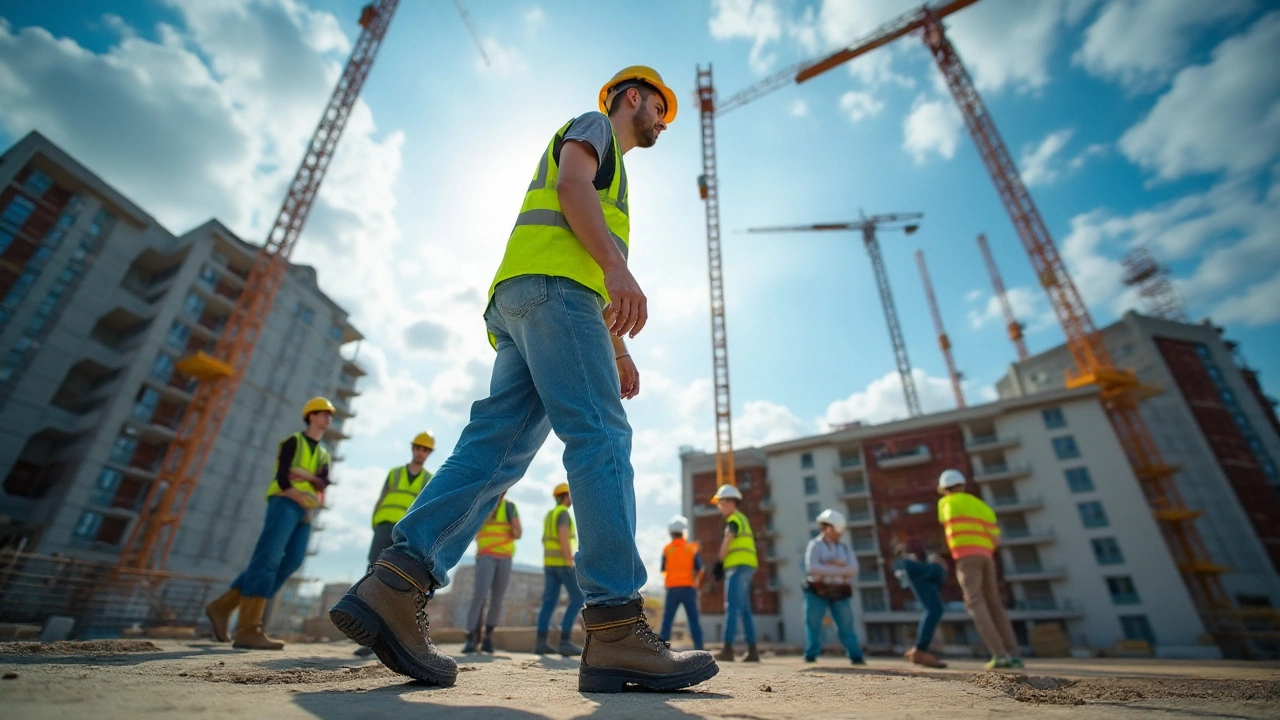In Ireland, where the landscape ranges from bustling urban environments to rugged natural sites, safety footwear is a critical part of workplace attire, especially in industries like construction, agriculture, and manufacturing. Protective footwear is not just about meeting regulations but ensuring safety and comfort through a workday filled with unpredictable Irish weather and terrain.
Whether you're navigating the rocky bluffs of County Clare or the industrial zones of Dublin, wearing safety shoes can prevent common workplace injuries. Many Irish workers and employers find themselves questioning what the law requires regarding safety footwear and whether there's room for personal preference or resistance.
This article aims to clarify these points, offering a blend of legal insight, cultural understanding, and practical advice tailored for Ireland’s unique work environment. We'll look into the reasons why safety shoes matter and provide a guide to selecting the perfect pair for your specific needs, keeping in mind trusted local brands and availability. Understanding the significance of safety shoes is a step toward fostering a safer workplace culture across the Emerald Isle.
- Importance of Safety Shoes in Ireland
- Legal Obligations and Employee Rights
- Cultural Considerations
- Selecting the Right Pair
- Prominent Brands and Local Availability
Importance of Safety Shoes in Ireland
When discussing the significance of safety shoes in Ireland, one must understand the diverse range of environments that workers navigate daily. Ireland, known for its unpredictable weather and picturesque landscapes, presents unique challenges to individuals working in sectors such as construction, agriculture, and even hospitality. Foot injuries can severely impact productivity and health, making protective footwear a vital element of occupational safety. Reports consistently highlight that nearly 25% of all disabling workplace injuries registered relate to slips, trips, or falls, which could often be prevented with the right kind of protective footwear.
In construction, for example, where hard hats and high-vis vests are commonplace, safety shoes are an equally critical component of the gear. They protect against hazards such as falling objects, sharp tools, or uneven surfaces. Imagine the building sites in bustling parts of Dublin or the expanding construction projects across Galway City, where risks always loom. Such areas necessitate sturdy shoes that are not only slip-resistant but also reinforced with steel toes or composite materials for enhanced protection. Without these, a simple misstep could lead to severe consequences.
According to the Health and Safety Authority (HSA) in Ireland, "Appropriate protective clothing and equipment should be considered one of the first lines of defense ensuring the wellbeing of workers in high-risk environments."
Safety shoes also play a notable part in industries like agriculture, which plays a significant role in Ireland’s economy. For farmers tending to sheep in the hills of Connemara or working the rich pastures of Kerry, encountering wet and slippery conditions is a daily reality. Here, waterproof and robust footwear helps protect against moisture-induced foot issues, while also guarding against potential injuries from livestock or farming equipment. The geographic diversity across Ireland further highlights the need for specialized footwear, adapted to both rugged rural tracks and urban landscapes brimming with industrial activity.
Such footwear is not just for compliance but for comfort and performance as well. Brands like Dubarry, known for their high-quality shoes, ensure that comfort goes hand-in-hand with durability, thus catering to the preferences of Irish workers who are often on their feet for extended periods. Furthermore, work environments around oil rigs or chemical sites require antistatic protection, a factor well-considered by many trusted footwear brands. Investing in the right safety shoes thus saves money and medical expenses in the long run.
In addition to all this, considering factors such as cushioning, breathability, and appropriate size make a significant difference. Employees’ engagement and performance can be considerably improved when paired with the comfort of well-fitted safety gear. As it stands, the Irish workplace culture is leaning towards creating a safer, healthier environment, emphasizing health and safety education while encouraging the use of robust protective footwear. Thereby, understanding and choosing the right safety shoes remains a crucial step in safeguarding the well-being of Irish workers across the myriad of industries that drive the nation’s economy.
Legal Obligations and Employee Rights
In Ireland, the legal framework surrounding safety shoes and workplace safety is well-established, with guidelines set forth in the Safety, Health and Welfare at Work Act 2005. This legislation outlines employers' and employees' responsibilities towards ensuring a secure working environment. Employers in Ireland are mandated to assess workplace hazards and provide suitable protective equipment, which often includes safety footwear, to mitigate risks inherent in the job. Industries like construction, manufacturing, and agriculture, which are significant sectors in the Irish economy, implement these regulations rigorously. The need for protective footwear stems from daily exposure to potential threats like heavy machinery, slippery surfaces, and extreme weather conditions prevalent across the island.
Employees, on the other hand, have particular rights under the same legislation, ensuring their safety and comfort during work hours. While they must comply with safety protocols, they also have the right to be informed of any risks associated with their duties and receive proper training on how to use the protective equipment provided. In cases where an employee feels that proper safety gear, like protective footwear, isn’t supplied, the law empowers them to address these issues through workplace representatives or directly with the Health and Safety Authority. The resolution of such concerns often involves consultations and assessments, ensuring that employees' voices are heard and their well-being is prioritised.
Interestingly, there are rare instances where employees may refuse to wear safety shoes, often on valid medical grounds. However, such exceptions require thorough documentation and dialogue between the employee and employer, along with the involvement of medical professionals. In Ireland, where the culture of storytelling and openness is deeply rooted, productive communication in these situations aligns perfectly with traditional values. The ultimate goal is to create a balance between regulatory compliance and personal health needs. A well-negotiated understanding, with adjustments made to accommodate individual conditions without compromising safety, is achievable and often observed in these scenarios.
Moreover, the enforcement of safety regulations in Ireland is supported by proactive measures from the Health and Safety Authority, which conducts inspections and audits across various workplaces.
"Ensuring that every worker returns home safe and sound is a shared responsibility; it's a matter of mutual respect and concern," states a report from the Health and Safety Authority. This organization not only enforces the law but also educates employers and employees about best practices in workplace safety, including the significance of adequate safety shoes.These initiatives aim to foster a culture of safety that resonates through every workplace, big or small, and ensures that the collective effort contributes to a safer working environment across the nation.
For non-compliance, the repercussions can be significant both legally and financially. Employers failing to provide necessary protective equipment, including safety shoes, may face sanctions, fines, or even legal actions. Employees, aware of these rights and obligations, can help uphold standards by engaging in open communication and reporting any lapses in safety. Trust and transparency between employers and employees in Ireland can often lead to improved working conditions, reflecting the collaborative spirit so integral to Irish work culture, ensuring safety and legal compliance are maintained throughout.

Cultural Considerations
In Ireland, the workplace is often a reflection of the rich interplay between tradition and modernity, shaped by a deeply rooted sense of community and a changing global landscape. The concept of safety, especially in areas like footwear, is not solely about compliance with regulations but is also informed by cultural norms and societal values. People in Ireland take pride in protecting and looking after each other, and this communal care extends to occupational settings, where protective gear like safety shoes becomes an emblem of collective responsibility. The importance attributed to workplace safety measures resonates with Ireland's cultural ethos of mutual support and respect.
In various Irish industries, especially those dealing with construction and agriculture, safety footwear isn’t just necessary; it is part of the daily work uniform, serving as a reminder of shared safety goals. The cultural backdrop of storytelling, which the Irish are famous for, is often filled with anecdotes—not unlike the ones where discussions about slips, falls, and foot injuries highlight the very real need for protective wear. This cultural narrative emphasizes not only safety but also subtly hints at an underlying expectation that workers respect these cultural touchpoints by wearing their safety shoes.
An Irish Health and Safety Authority report once highlighted, "Over 60% of reported workplace injuries could have been prevented with appropriate personal protective equipment."Such data underscores the cultural motivation behind investing in protective measures.
However, not all traditional practices disappear easily. Sometimes, individuals might feel nostalgic about past practices where heavy boots or hard-soled shoes were the norm, leading to resistance towards the newer, more specialized forms of protective footwear mandated by contemporary regulations. With Ireland's often unpredictable weather contributing to wet and slippery conditions, understanding these cultural dynamics can play a part in effectively introducing more stringent safety standards in the workplace.
Irish festivals and gatherings often celebrate resilience and hardiness, traits that are mirrored in the choice of footwear that depicts both style and function. Yet, it’s interesting to note the gradual shift in preferences, as younger generations more exposed to international trends are keen on mixing traditional styles with modern safety shoes. Brands popular within Ireland, such as Dubarry for durability and Ecco for modernity, bridge the gap between fashionable attire and safety requirements, making them an integral part of professional wardrobes across sectors.
Selecting the Right Pair
When it comes to choosing safety shoes in Ireland, the diverse climate and varied job sectors necessitate careful consideration. Not only do the shoes need to provide protection, but they should also promise comfort for the long hours typical in many professions, be it construction or agriculture. First and foremost, it's crucial to understand the specific hazards present in your workplace environment. Are you dealing with heavy machinery, slick surfaces, or perhaps sharp objects? Each of these scenarios might demand distinct types of protective footwear, such as steel-toed boots or slip-resistant soles.
Another significant factor to consider is material. In the ever-changing Irish weather, shoes can often be subjected to damp and cold conditions. Opting for shoes made from water-resistant materials or those with breathable linings can vastly improve comfort over the course of the day. For instance, choosing boots with a Gore-Tex lining can offer resistance against moisture while allowing for breathability, thus reducing the risk of sweaty feet which can lead to other health issues.
Comfort is more than just about the materials, it also involves fit. Every brand can have different sizing, much like the difference between familiar Irish brands like Dubarry and international ones like Timberland. Many experts suggest trying on several pairs from different brands and even walking around the shop to feel the fit. Break-in periods can also vary, so if a shoe feels comfortable immediately, it might save you days of discomfort. An interesting study by the Irish Safety Authority notes that properly fitted footwear can reduce workplace injuries by up to 60%.
"One of the most overlooked elements in workplace safety is the choice of footwear," notes Dermot O'Connor, a renowned safety consultant in Ireland. "The right pair not only protects you physically but also supports your posture, aiding in overall health and productivity."
In addition to fit and material, you might consider the additional features modern safety footwear offers. In recent years, innovations such as toe protection composites and shock-absorbent heels have made protective footwear more advanced than ever. These features, once considered luxuries, are increasingly becoming standard. Keep an eye out for shoes that meet European safety standards, often indicated by marks like CE EN ISO 20345, which assure a basic level of protection.
Finally, accessibility and brand availability are perhaps as vital as any technical feature. Fortunately, Irish markets are well-serviced by a range of local and international footwear brands, allowing selections to be both adequate and varied. Whether you're purchasing from local retailers in Dublin's shopping hubs or online platforms, ensuring a straightforward return policy can save considerable hassle should adjustments be necessary. Engaging with customer reviews can also provide insight into the practical experiences of others in similar work fields, aiding in making an informed decision.

Prominent Brands and Local Availability
For those seeking high-quality safety shoes in Ireland, the market is well-stocked with brands that blend durability and comfort. One such brand that stands out is Portwest, a company headquartered in County Mayo, known for its rich legacy in manufacturing protective garments and footwear. Their safety shoes are highly regarded across diverse sectors for their innovative technological designs that cater to the heavy demands of all-day wear.
Dubarry, a name often associated with quality and tradition, offers an impressive line of protective footwear suitable for both industrial and agrarian settings typical of the Irish landscape. Not forgetting Limerick’s O’Sullivan Safety, a local distributor providing a range of safety footwear curated from global leaders in protective gear. They offer a selection that includes steel-toe boots and lightweight options, ensuring there's something for every work environment.
The availability of safety shoes throughout Ireland is facilitated by major retailers like Arco and Safety Direct, who have dominated the safety industry by ensuring a steady supply of reliable footwear to meet the discerning needs of Irish workers. These establishments understand the Irish terrain and climate, offering an inventory that meets specific demands of the local workforce.
For individuals looking to purchase protective footwear online, sites like All Safety Gear and Adverts.ie provide nationwide delivery, often showcasing competitive pricing and promotions. It's noteworthy that during the last years, there has been a 15% increase in the demand for eco-friendly safety footwear in Ireland, adopting sustainable practices even in safety gear manufacturing.
An oft-quoted Irish occupational expert once stated, "In Ireland, where every sector from crafts to construction holds its own set of challenges, the correct pair of safety shoes can be as vital as skills acquired on the job." This highlights not only the importance of products available but also the need for informed choices based on workplace requirements.
